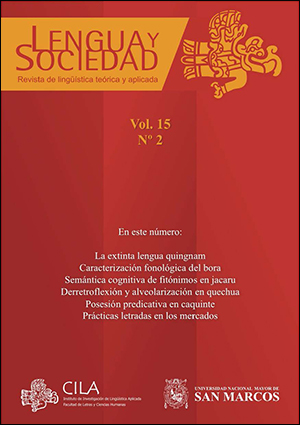Predicative possession in Caquinte (Campa-Arawak)
DOI:
https://doi.org/10.15381/lengsoc.v15i2.22582Keywords:
predicative possession, alienability, existential, possessor raisingAbstract
In this paper we describe possessive constructions in caquinte, an Amazonian language spoken in the departments of Junin and Cuzco. Based on data collected in the field, we will analyze the expressions of predicative or sentence-level possession. In this document, we will see that the Caquinte language categorizes its names based on their alienability, a criterion that involves both grammatical and cultural features. We will distinguish the names that need to be possessed (inalienable) from the ones that do not need a possessor (alienable) and from those that are not used to be possessed. As the main focus, we will describe the semantics and morphosyntax of the verbs that express possession. Finally, we will analyze the noun incorporation and verbal aplicativization processes, both involved in the possession dominion.
Downloads
Published
Issue
Section
License
Copyright (c) 2015 Antonio G. Castillo Ramirez

This work is licensed under a Creative Commons Attribution 4.0 International License.
AUTHORS RETAIN THEIR RIGHTS
a. Authors retain their trade mark rights and patent, and also on any process or procedure described in the article.
b. Authors can submit to the journal Lengua y Sociedad, papers disseminated as pre-print in repositories. This should be made known in the cover letter.
c. Authors retain their right to share, copy, distribute, perform and publicly communicate their article (eg, to place their article in an institutional repository or publish it in a book), with an acknowledgment of its initial publication in the journal Lengua y Sociedad.
d. Authors retain theirs right to make a subsequent publication of their work, to use the article or any part thereof (eg a compilation of his papers, lecture notes, thesis, or a book), always indicating its initial publication in the journal Lengua y Sociedad (the originator of the work, journal, volume, number and date).






